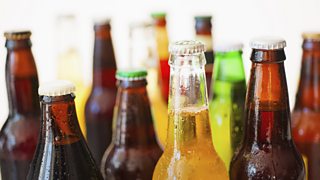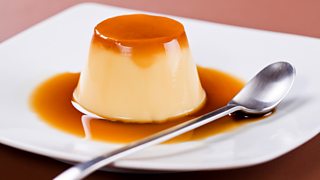Nine things we learned about hangovers
We’ll say this very quietly, just in case you’ve found this page while feeling a little worse for wear, but we’re going to be talking about a sensitive subject here: hangovers.
For anyone who enjoys a drink, hangovers are usually the price you pay the next day, the thing that makes you vow never to drink again. But why do we get them? And is there really any reliable way to get rid of them?
In this episode of Radio 4's The Food Show, Jaega Wise speaks to the experts to find out the science behind hangovers and the possible ways to minimise them. Here are nine things we learned about hangovers.
Hangovers: a guide to the morning after

For many, drinking is part of our national identity but the immediate after effects of alcohol, it turns out, are an under- investigated part of the experience. In The Food Programme, Jaega Wise looks at hangovers from all angles – science, history and culture.
1. Hangovers only recently got a definition
You may know exactly how one feels, but for a long time there was no official description of a hangover. “Surprisingly, for a while we didn’t have a definition,” says Dr. Sally Adams, an associate professor of psychology at Birmingham University, and a hangover expert. “The scientific definition was just that it’s a state of misery following alcohol consumption.” Sounds about right, but there is now an updated definition. “The official definition is now that it’s a collection of physical and psychological symptoms after a single period of alcohol consumption, but most importantly, when your blood alcohol concentration is approaching zero.” So, if you wake in the morning still feeling the effects of alcohol, you are not technically hungover… yet.

2. Your body produces poisons while trying to break down alcohol
If you have that headachey, vomity, dry-mouthed feeling of a hangover, you probably know some of the things wrong with you. You know you’re dehydrated, but that’s only part of what’s causing you pain. “We also see an electrolyte imbalance and the inflammation of the stomach and the small intestine,” says Dr. Sally, which explains difficulty keeping food down. Alarmingly, your body is also poisoning itself. “While we’re trying to break down alcohol or metabolise it, we produce something called acetyl aledehyde,” she continues. “It’s toxic to humans, and that’s why we might vomit, sweat or feel our heart racing… So there’s a lot more going on than dehydration.”
3. Humans have strange psychology around hangovers
Have you ever told yourself, after a particularly rough hangover, that you’re never drinking again? Then broken that vow a few weeks later? It’s something we only seem to do with alcohol. “The one comparison I always use is having food poisoning,” says Dr. Sally. “You experience food poisoning, which is pretty unpleasant and has really similar overlap with hangover in terms of symptoms. But usually when you’ve eaten something and it gives you food poisoning, you don’t eat it again… [But] we go back time and time again to drink alcohol.” Dr. Sally says the scientific consensus is that the pleasure a lot of people get from alcohol is just too great to give up. “The conclusion I’ve come to, as a psychologist, is that the positives from alcohol far outweigh what happens the next day.”
4. There’s a reason you feel anxious when hungover
A hangover can often include feelings of misplaced guilt or anxiety. It may be some comfort to know this isn’t just something you feel. It’s a chemical reaction. “Alcohol is a relaxant in small amounts,” says Dr. Sally. “It reduces anxiety.” ‘Small amounts’ is key. The more you drink, the more of that relaxing chemical you’re getting, which confuses your brain, so it tries to restore the balance. “The next day, the brain is trying to right itself…It releases chemicals that kind of increase or induce anxiety and low mood.”

5. Hangovers cost the economy over Β£1.4 billion a year
Most people are highly unproductive when hungover, which is fine when all you’ve got to do is lie in bed and binge some undemanding telly. But what about those hangovers when you’ve got to go to work? It’s estimated that around 89,000 people go to work hungover every day (not the same people every day) and that lack of productivity costs the economy £1.4 billion every year (figures from Institute of Alcohol Studies).

6. It may be possible to fake the positive feelings of alcohol
David Nutt, a psychopharmacologist, has been working for over a decade on an alternative to alcohol. He spent a long time researching treatments to stop addicts craving alcohol, but found no way to do this. Instead, with his team at GABA Labs, he’s developing “an alternative, something that gives people what they want from alcohol, which is mostly relaxation and sociability, without the harms.”
That alternative, Alcarelle, is currently in development. “The brain has at least 80 different chemical neurotransmitters and alcohol interferes with probably a third or more of them,” he says. “That’s where a lot of the bad effects come from.”
His focus is on working out what causes the positive effects and isolating those. He says those effects are caused in a part of the brain called the GABA system. “By focusing on that system…we were able to make molecules that give the good effects like alcohol…but they don’t do all the other things alcohol does.

The maleficent seven...
Writer and hangover expert Shaughnessy Bishop-Stall defines his seven types of hangover.
7. There are some very odd hangover cures around
Shaughnessy Bishop-Stall, author of Hungover: The Morning After And One Man’s Quest For A Cure, has done a lot of research into how to banish hangovers. “I did a deep dive into hangover cures, all the way back to the ancients and tried everything I could come across,” he says. “There is some weird stuff out there.” Those include pickled eyeballs and “different kinds of smoked fish.” Try keeping those down.
8. N-Acetyl-L-Cysteine may be your saviour
Asked if there are any real hangover cures, Shaughnessy says we should be looking for anything containing an amino acid call N-Acetyl-L-Cysteine. “Interestingly, we find it in some of our most common hangover foods throughout history,” he says. “Birds’ eggs contain N-Acetyl-L-Cysteine, which is one of the reasons perhaps that a British fry up may work.” He also suggests taking B vitamins, magnesium and an anti-inflammatory. Shaughnessy’s favoured anti-inflammatory is frankincense, like the gift a wise man brought to baby Jesus.
9. The old classics may work just as well
Dr. Sally isn’t convinced of the evidence for cysteines curing hangovers. While she no longer drinks, she advises the tried and tested methods, which may not cure but will probably help. “Water for dehydration, then replacing electrolytes you might have lost. So, a sports drink…and something to settle your stomach, because there’s a lot of inflammation in that area. Doing something that makes you happy…and sleep is really important.” Really she says, “there’s no quickfire way to do it, apart from, you know, not drinking or drinking in moderation.”
Listen to The Food Programme – Hangovers: a guide to the morning after

It's meat and drink to Radio 4...
-
![]()
Can a non-alcoholic drink reduce social anxiety?
Amit Katwala meets Professor David Nutt who works for a company that is creating a drink that aims to mimic the calming affects of alcohol.
-
![]()
The Bottom Line: Alcohol-free drinks
Why is the market for low alcohol beers and spirits booming? Evan Davies investigates.
-
![]()
Can comfort foods really make you feel better?
Well yes, they actually can, says Sheila Dillon, presenter of The Food Programme.
-
![]()
Food, Philosophy & Football: Christmas with Delia Smith
Delia Smith, the woman who taught the UK to cook speaks to Sheila Dillon about her long career in food, and what she did next.




